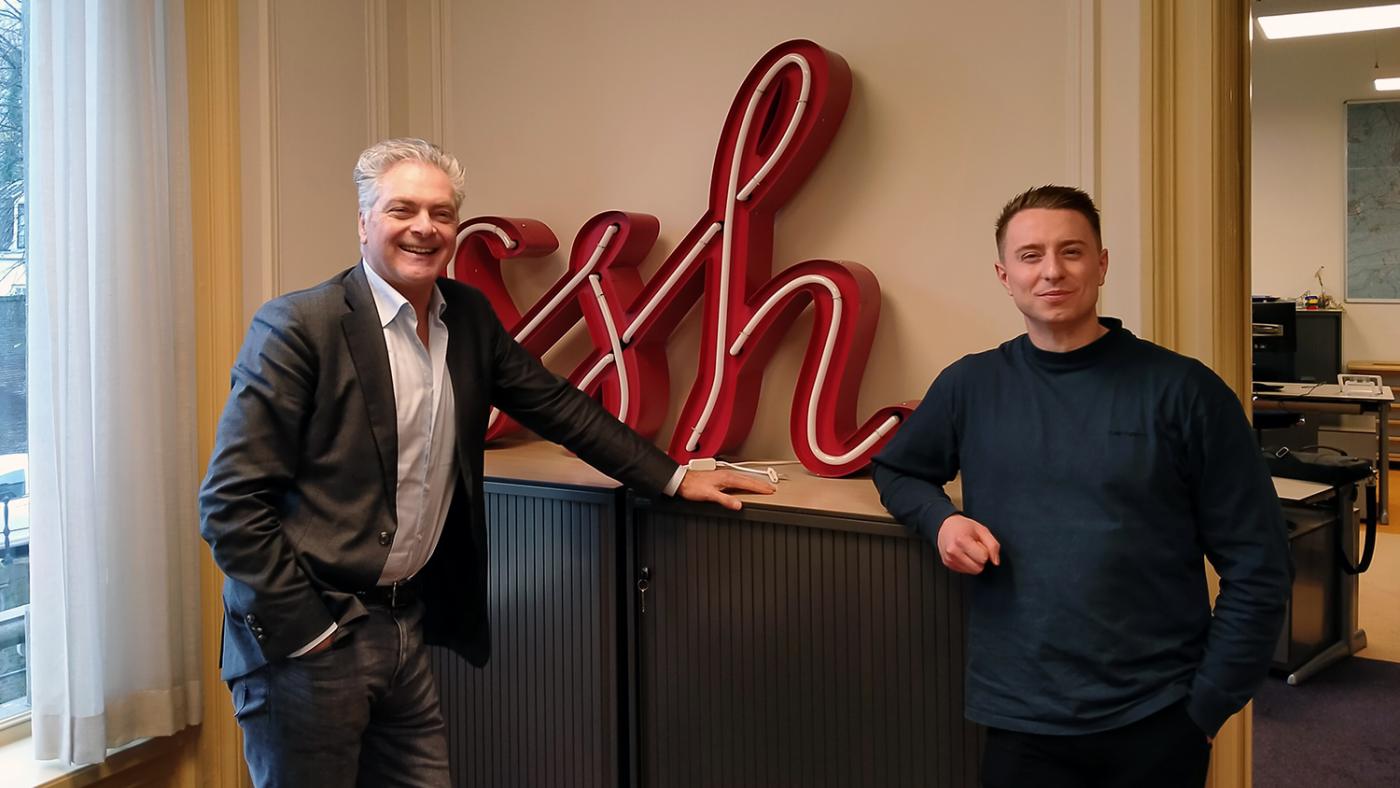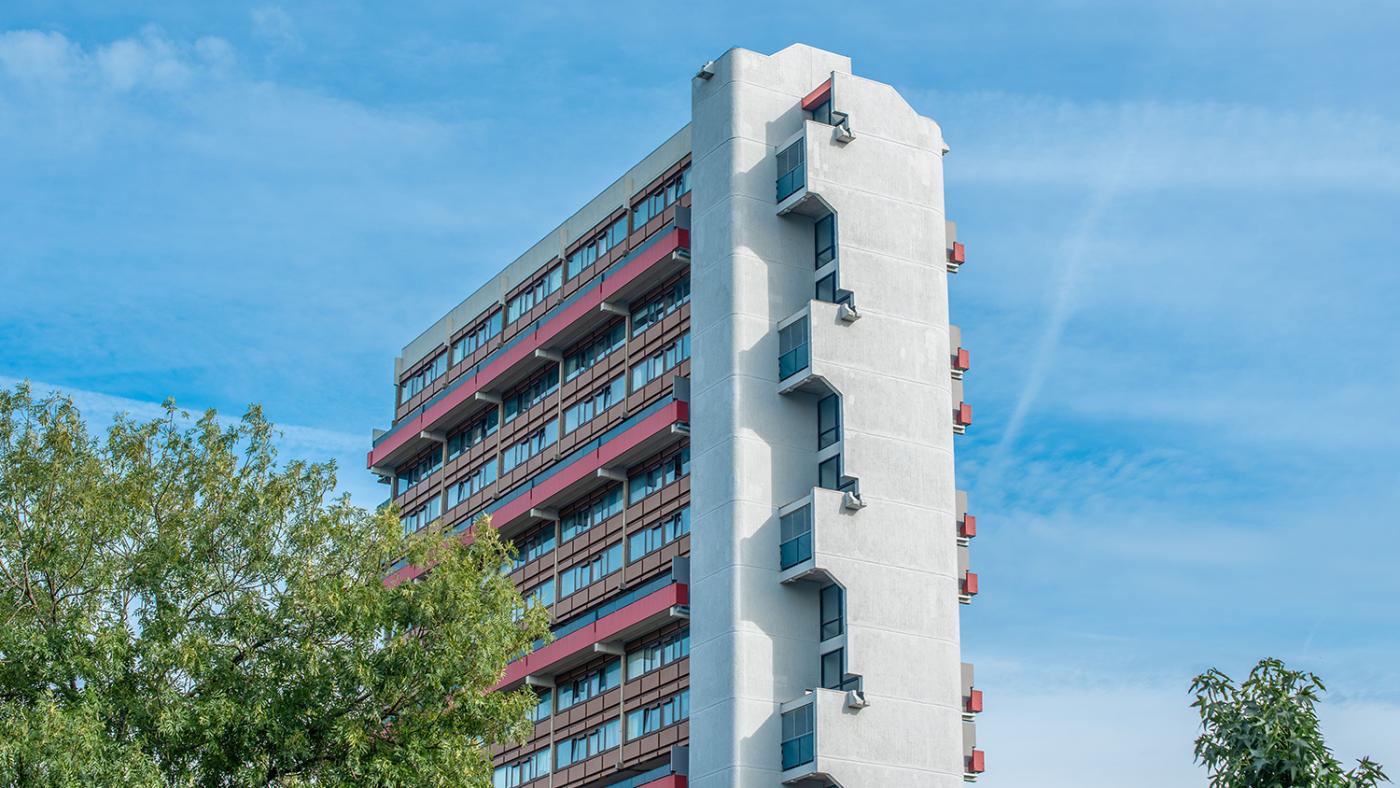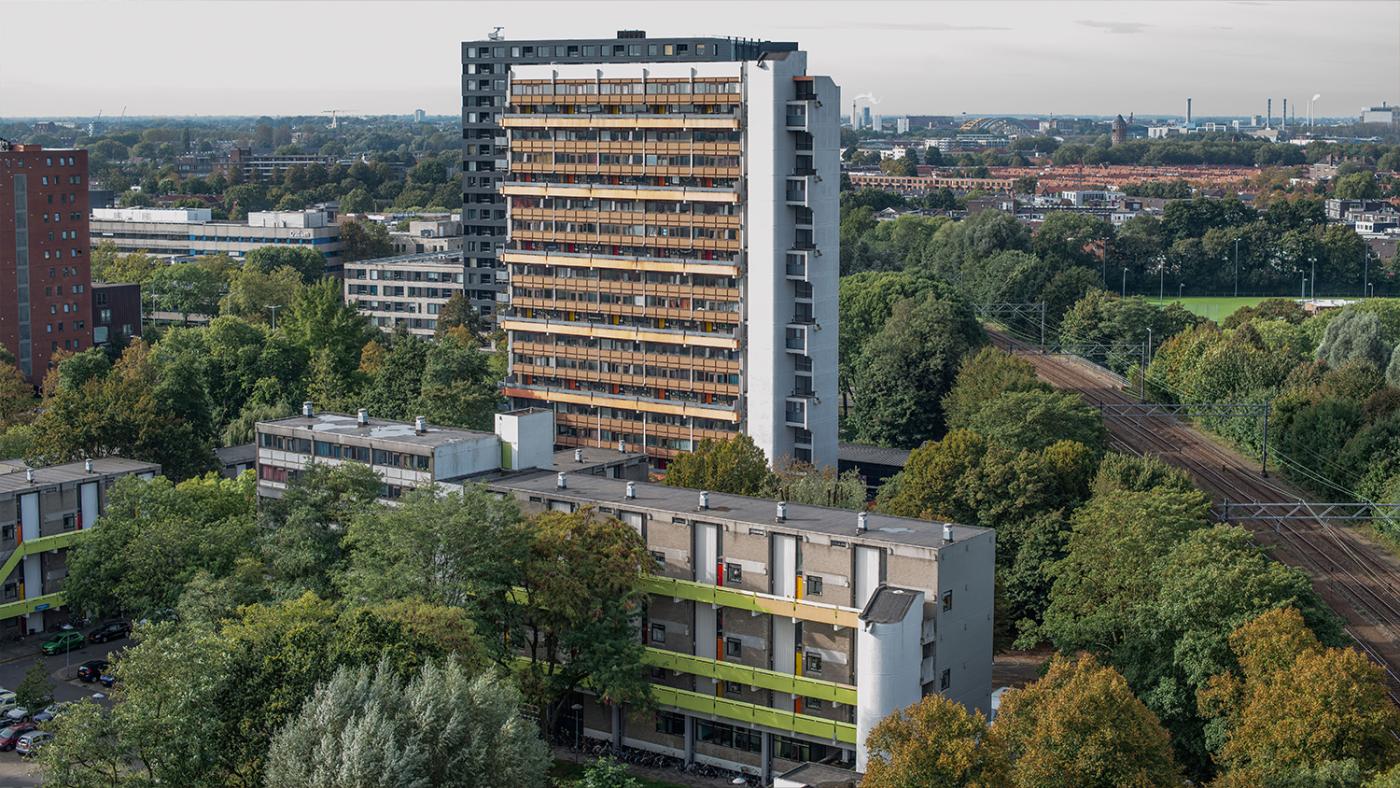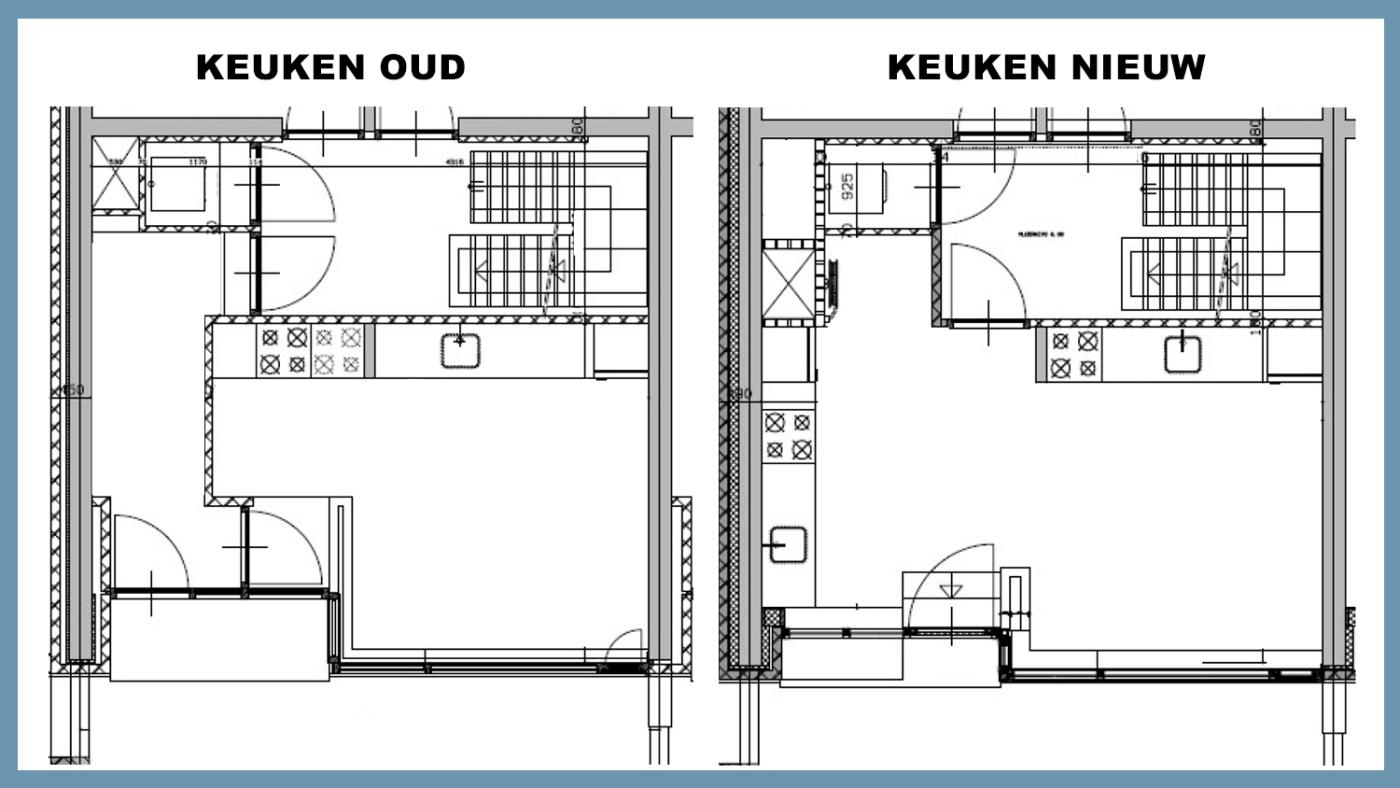SSH sees unique opportunity to make student flat more sustainable
‘There’s no plan B if the residents don’t agree with the plan’

The three hundred students living in the Red Flat in the Tuindorp West Complex were caught by surprise when, on October 25, they were told about the plans for their building. Student housing corporation SSH wants to thoroughly renovate the building and make it more sustainable. As the façade, among other things, will need to be replaced, the residents will have to leave their homes before July 31, 2024. The students will be given priority in finding a new room or renting a studio, and will also receive compensation for the move. The SSH will visit each unit to make individual agreements. This way it hopes that at least 70 percent of the residents will agree to the plans. They have until February 1 to vote. If there is no 70 percent majority in favour of the plan, it will not happen.
After the news broke, there was a lot of unrest among the residents. ‘Why didn’t they communicate earlier and better?’ and ‘Why aren’t we given more time to move?’ were the most important questions. Students even formed a protest group that wants to persuade the SSH to give students more time, so they can move out in phases. A week after the news was announced, the SSH organised an info evening, but still, many students had questions.
DUB stopped by the SSH headquarters to present these questions in person to Rob Donninger, the SSH director. And to ask why the renovation can’t start a little later.

The Red Flat, photo SSH
Is it true that it wasn’t possible to inform the students earlier?
We’ve been looking into ways to renovate the Tuindorp West Complex since 2018, and in the meantime, we regularly communicated to the tenants about the progress of our plans. At first, we investigated whether it was possible to complete the renovation by adapting the current installations. We conducted a pilot in three different homes for this. Unfortunately, the conclusion was that these adjustments did not lead to the intended sustainability improvements. The tenants’ experiences weren’t positive either, because the installations caused a buzzing noise in the house, for instance.
At that time, it became clear to us that we could only make the building more sustainable if we also updated the exterior of the buildings. That meant the residents would have to move out. But at that time, we weren’t even certain whether it was possible, and had to study this further. That’s why we didn’t communicate this plan to the residents at that time; we didn’t want to cause unnecessary distress.
As the plan became more concrete, we did inform the residents that we were working on big plans to make the building more sustainable. In February and early October of this year, we sent them emails. They didn’t mention that the students would have to move out, because at the time we weren’t yet certain that that was the case. Moreover, each year, around a third of the residents move out. So it doesn’t make a lot of sense to communicate something like this years in advance, because many of the residents will have moved out by the time the renovations start anyway.
I also discussed our plans in the TV show Radar last year. The TV show was made because concerned TWC residents had contacted the media to tell them it was cold indoors, that the wind was blowing through their homes, and they were concerned about the costs of utilities. In that show, I explained that we would present a concrete plan for the renovations within a year. We also explained this to Boks, the SSH tenants’ association.
So tenants who’ve been paying attention could have known that the plans were coming. But I completely understand that this kind of information is quickly forgotten, too. Especially because in the meantime, a lot of new students moved in. You probably don’t realise something’s going to change until you’re directly confronted with it. So when the plans were finalised, we told them. I think that any other moment would’ve cause negative reactions. We truly understand how much trouble the renovations and the corresponding move will cause students. But it’s truly necessary, both for the environment and for the future tenants. Someone will have to make that sacrifice.

A part of the Tuindorp-West Complex, photo SSH
Why did it take so long before the plans were finalised?
If and when the project can happen depends on multiple factors, not all of which we can influence, and some are based on luck. We really have a unique opportunity now to start the project.
The first task was to create a technically feasible plan. That was finalised a year and a half ago. But that wasn’t all. We also had to obtain permission from the Cultural Heritage department of the Utrecht municipality before we’re allowed to make any changes to the buildings’ exterior. The buildings have been a municipal monument since 2017. To obtain that permission, we first had to thoroughly test whether the intended sustainability goals could be achieved by only making adjustments to the interior. After that, we had to create the plan in such a way that the remarkable exterior architecture wouldn’t be harmed too much, because of its monument status.
The project also had to be financially feasible. It’s a project that will cost around 60 to 80 million euros; our second-most expensive project. The costs equal our entire annual turnover. For the renovation, we have to take out a loan, for which we’ll have to pay interest. We calculated all this, and the coming year is a financially opportune moment.
Lastly, we had to find a contractor that can complete the project within the time and budget that we’d thought about, and who’s also available at the right time. A tender like that takes time, and you never know exactly when you’ll find a suitable contractor. That, too, is almost successful: we’re in the final phase of the selection process.
Why can’t you give the residents more time to move out? Like an extra year?
No, a year truly isn’t possible. To be honest, we should really start as soon as possible now that the opportunity is there. As mentioned, 2024 is a financially opportune moment to start the renovations, but things might be different in the year after. Moreover, you can never be entirely certain that the municipality will still think it’s a good plan in a year. In theory, they can revoke their permit. We’ve also already requested the environmental permit. Once that’s granted, we’re bound to a certain time period in which we have to complete the project. There’s not a lot of flexibility in that. And contractors cannot remain in the preparatory phase for two years, either; they’ll decide to do other projects instead.
There are more factors at play as well. We planned this in such a way that in between all our other projects, we’ll have enough staff to work on this renovation. We’re also certain that in the coming period, we have enough capacity to ensure all three hundred residents will have a new home with us. All in all, there’s a green light in all areas this next year; a unique opportunity. But if we wait too long, that might change. Only one light has to turn red for it to become less opportune for us to do this project.
Will you try to convince the naysayers during the home visits?
No, many people misunderstand this. We want to visit each unit anyway, whether they’re pro or con. We understand that the move can have a major impact on people. For that reason, we want to talk to the residents, answer their questions, see what their wishes are, and whether there’s anything we can do for them.
Is it possible for housemates to move to a new home together?
There’s only a very slim chance of that happening. We can look into it for people for whom this is incredibly important, but we cannot guarantee it. And it definitely won’t be possible for every unit. In the near future, we’re completing a lot of new buildings, but we cannot count on those buildings being completed in time. Moreover, they don’t have enough capacity to house everybody. That’s why we’re going to find solutions at an individual level. Perhaps there are a lot of residents who are happy to move out, because they’ll be given priority on studios. Or perhaps some others want to move out, but they need physical help to do so. There’s not one single generic solution for everyone.
Many students aren’t eager to interview (hospiteren, red) for rooms. Can’t you just appoint them rooms?
That’s a difficult question. We do have that option, but on the other hand, we want to give people the chance to find a place where they mesh well with the people who are already living there. So it seemed like a good idea to offer that option of interviewing for rooms. But for those people who don’t want this, we’ll try to find another solution.
And do you have a plan for the subletters, or the tenants who’ve just graduated?
We’ll try to find individual solutions. There’s a difference between the people who only have six weeks left to live with us anyway, or people who still have 11 months to go. We’ll take those situations into account. In theory, subletting is no problem, as long as it’s taken care of legally. The main tenant will just be given priority on a new home, and the subletter can go and move there. if necessary, we’ll help the main tenant, for instance if they’re abroad, in choosing a new home, and moving.
And that 650 euro financial compensation? Can that be increased?
No, it’s based on a national regulation, and is recorded in the Utrecht ASP (‘General Social Plan’, ed.) that was agreed upon by tenants, municipality, and housing corporations. That should cover the costs of a move. Moreover, we’ll be paying that compensation from the money that comes from all the SSH tenants. If people think they can command a higher compensation by voting against the renovation, I can promise that that won’t happen.
Won’t the SSH waitlist be much longer due to these internal moves?
Of course, it won’t have a positive effect on the waitlists if suddenly three hundred people have to find a new home, but it’s a temporary effect. The idea is to only start work on the Yellow Flat after the work on the Red Flat has been completed. That means many students will be able to move there. moreover, while three hundred units will become temporarily uninhabitable, we’re also completing around 1,500 new units with our projects Wisselspoor, Baobab, and the High Five.
If students move out now, their rooms will remain empty. Won’t that lead to a lack of social safety in the buildings?
Possibly, but this situation is not unique, and won’t last long. If the renovations are a go, we’ll temporarily rent out the empty units. Perhaps by the end of that, we’ll have to close some things off, install some cameras, or hire some temporary staff. If it turns out to be necessary, of course we’ll take those measures.
Just to be clear, what will the renovations look like?
Because we’ll be changing the constructional shell, we want to make it as sustainable as possible. We want to change the façades and the end walls, remove asbestos, and replace the rotting Styrofoam insulation. The gallery façades will change a bit and in that way, we’ll make the portico doorways smaller, the living rooms bigger, and we can insulate the rooms better. We also want to renovate the bathrooms and kitchen.

De kitchen will be bigger after the renovation
What happens if you don’t get a 70 percent vote in favour?
Now, it may look as though we won’t make it to that percentage, but I’m not ruling out that people might vote in favour after all, despite the initial negative responses. Of course, it’s not fun to hear that you have to move out, but I hope the residents will understand that we’ve got a good plan.
If it turns out that the renovations cannot take place, it doesn’t matter that much to us. But it would be a shame. Hopefully, people will realise that we’re only doing this project because we’ve got a great opportunity now; not because we want to make a profit or because we legally have to. According to the Climate Agreements, the SSH doesn’t have to be carbon neutral until 2050, so the buildings could remain in their current state; but that isn’t ideal for the residents either.
Of course we will consider a second poll if we only just fail to get the 70 percent. But if the plans only get a 5 percent approval rate now, we’re not going to spend more time and energy on this. There is no plan B with a smaller package with fewer procedures or anything like that. We’ll have to weigh our chances and priorities again, and we truly don’t know what that will look like then.